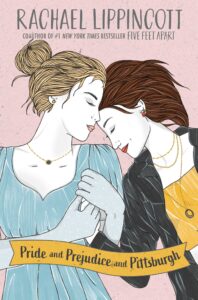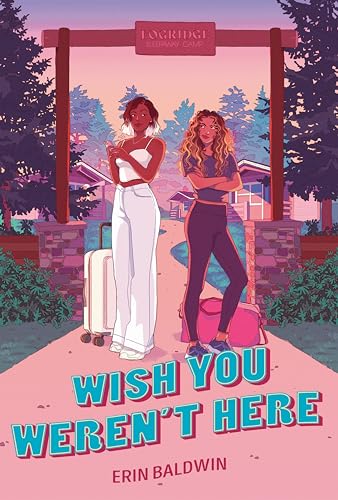Pride and Prejudice and Pittsburgh by Rachael Lippincott begins with two women, both of whom find themselves quite lost in life. Audrey Campbell lives in Pittsburgh, Pennsylvania in the year 2023, and a recent breakup and loss of her artistic spark has left her floundering, with no clear path to the future she’s dreamed of. Lucy Sinclair, who lives in Radcliffe—her family’s estate in England—in the year 1812, is being pressured into a marriage with a rather unpleasant man, for her father’s financial benefit. Neither woman is happy with their lot, but have settled into a sort of familiarity with the unhappiness, unsure of how they could possibly improve their situations.
This is where time travel comes in.
Audrey finds herself thrust back in time to 1812, crash landing in her work clothes (or as Lucy calls them, her “undergarments”) in the yard behind Radcliffe. Lucy quickly agrees to help Audrey, seeing this as a last adventure before she finds herself chained to a man she despises—an excuse to do the things she has been denying herself. The two women’s stories form a double ticking clock, as the pair realize that Audrey has a limited amount of time to figure out how and why she was sent back, and Lucy has a limited amount of freedom left before her inevitable engagement and marriage.
The relationship between the two leads is strongly written and convincing, especially as it deepens into friendship and beyond. The two women do not initially have much attachment to each other beyond chance, but their shared attempts to acclimatize Audrey to the world of 1812 and to solve the mystery of her traveling there develop a bond, as well as a mutual attraction. There are also several quite enjoyable “red herring” romantic interests, as both female leads begin the story believing themselves to be heterosexual. These characters serve plot and character excellently, driving the story forward and helping to confuse and inform the leads as they come to terms with their sexualities.
Pride and Prejudice and Pittsburgh is a sapphic romance, so queerness is readily apparent. The two women share a denial of their attraction to each other, both accepting that their feelings for women step beyond platonic during the course of the story. Audrey is bisexual, though has been denying herself for years, not feeling valid in that identity while she was in a relationship with a man. Lucy is never labeled, but does note that she has never felt drawn to any man that has been put before her. Both have been shoved into a heteronormative box by the men in their lives. Lucy, by her domineering father, and Audrey, by her notably less malicious but still heteronormative ex-boyfriend. The story of these characters breaking out of this box nicely mirrors the path of the story as a whole, as they break out of the mediocrity they have both settled into.
While the story of Pride and Prejudice and Pittsburgh does many things well, there are some small flaws that prevent it from reaching greater heights. The premise is fun and well executed, but the story beats don’t do much to elevate themselves above other queer romance stories. The villains, Lucy’s father and the man he intends her to marry, are very one-note and exaggerated, caricatures of the misogynistic nobleman of the time period. While it makes sense that the story only has so much time to spend, and chooses to explore and develop the protagonists, it is unfortunate that the villains are so lacking in complexity.
All in all, Pride and Prejudice and Pittsburgh is a rather good story. The protagonists and side characters are interesting and well developed, and the setting is fun to explore and serves its purpose. Though the villains are not as interesting, they don’t detract significantly from a story that is well worth the read.


